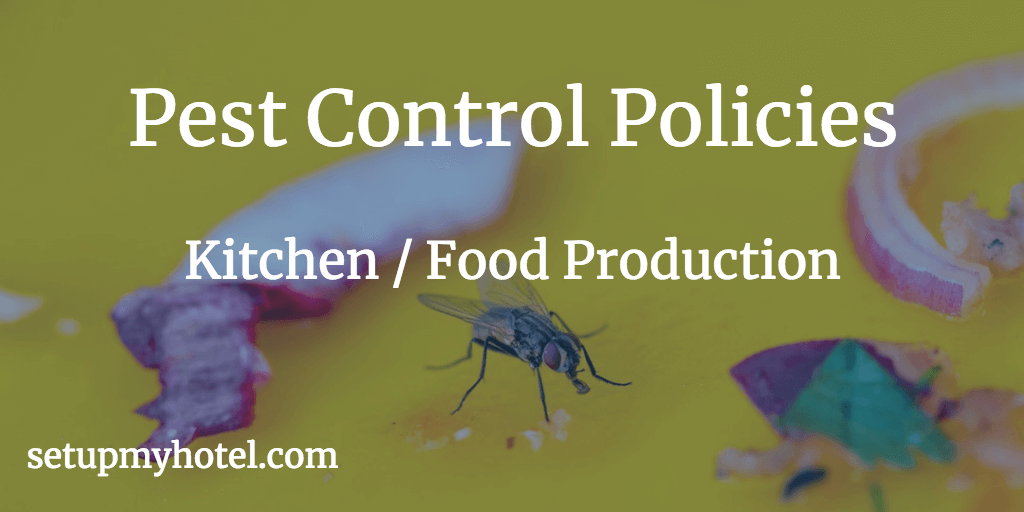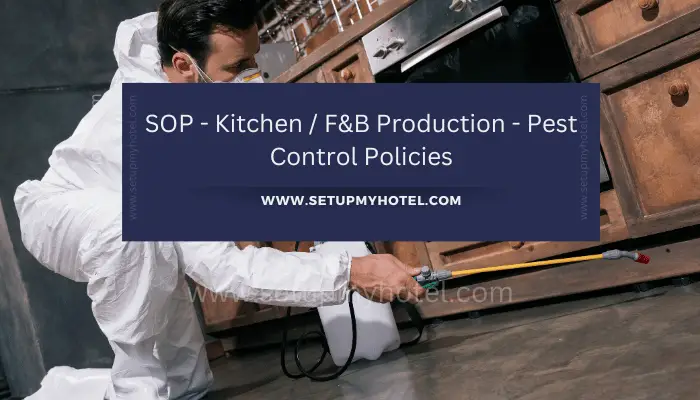Pest Control Procedure and Policies
Pest control is a crucial aspect of maintaining a clean and safe kitchen or food and beverage production area. It is important to have a standard operating procedure (SOP) in place to ensure that all necessary measures are taken to prevent pests from entering and contaminating the area.
The SOP should include regular inspections of the kitchen or production area for signs of pests such as droppings, gnaw marks, and nesting materials. In addition, all food items should be stored in sealed containers, and any spills or crumbs should be cleaned up immediately.
It is also important to have a pest control plan in place that includes the use of traps, baits, and pesticides. However, care should be taken to use these methods in a way that is safe for both humans and animals.
Regular training should be given to all staff members to ensure that they are aware of the pest control policies and procedures. This will help to ensure that everyone is on the same page and that the policies are being followed consistently.
By implementing a comprehensive SOP for pest control, you can help to ensure that your kitchen or food and beverage production area remains clean, safe, and free from pests.
The purpose of this policy is to ensure that the hotel kitchen premises have refrained from all pests. Also to ensure problem areas can be identified and effective measures can be taken promptly while ensuring that the minimum disturbance is caused to the kitchen operation.
All sincere efforts should be made by the kitchen staff and the management to ensure that pests are controlled in the kitchen area, including the use of a licensed Pest Control Operator (PCO). The kitchen staff should follow the pest management standards defined by the hotel using the following steps.
Kitchen Pest Control Standard Procedures:

1) How to deny access to pests in the kitchen area?
- Always make sure to use reputable suppliers for all raw material deliveries.
- Physically check all deliveries for any contamination or pests before they enter the restaurant.
- Immediately refuse the shipments that have signs of pest infestation, such as gnaw marks on the cardboard containers used to supply the raw materials.
- Keep all exterior openings closed tightly.
- Check doors for proper fit as part of the regular cleaning schedule.
- Report any signs of pests to the HousekeepingA department of the rooms division; responsible for cleaning the hotel's guest rooms and public area... ManagerManager is a person in the hotel operations who is assigned to manage or supervise a group of employ... or the pest control manager.
- Report any openings, cracks, broken seals, or other opportunities for pest infestation to the maintenance team.
2) How to deny pests on food, and water and identify pest hiding or nesting place in the kitchen area?
- Make sure to dispose of garbage as per the standard and correctly on tot the designated areas.
- Keep garbage containers clean, in good condition, and tightly covered in all areas, this applies to both indoor and outdoor areas.
- Always clean up any spills around garbage containers immediately.
- WashWash - 1) Brushing or coating a food item with a liquid such as egg white; milk or egg wash. 2) The ... the containers thoroughly, rinse them, and sanitize containers regularly.
- Store recyclables in clean, pest-proof containers away from the building.
- Place food and supplies after delivery as quickly as possible into the appropriate storage area.
- Keep all food and supplies at least 100 to 150 cm. off the floor and a minimum of 50 cm. away from walls.
- Always remember to refrigerate foods such as powdered milk, cocoa, and nuts after opening as these foods attract insects, but most insects become inactive at temperatures below 5º CelsiusCelsius - The thermometric scale on which 0� Celsius is the freezing point and 100� Celsius is t....
- Place other opened packages of cereals and grains in storage containers with tight-fitting lids.
- The Executive Chef or Sous Chef should make sure to implement the FIFO (First In First Out) inventory rotation, so pests do not have time to settle into these products and breed.
- Clean the Food production facility thoroughly and regularly with appropriate cleaning agents and methods.
- The careful cleaning of the kitchen and storage area keeps the area neat and clean, and also eliminates or destroys insect eggs, and reduces the number of places pests can safely take shelter.
3) How to properly use pesticides in the kitchen?
- The Pest Control Operator (PCO) should decide if and when pesticides should be used in your establishment.
- Only such certified Pest Control Operators (PCOs) are trained to determine the best pesticide for each pest, and how and where to apply it.
- The PCO is responsible to store and dispose of all pesticides used in your establishment.
4) Guidelines for storing pesticides in the food production/kitchen area?
- Proper guidelines should be used for all over-the-counter pesticides that are stored in the kitchen.
- Make sure to keep pesticides in their original containers.
- Store pesticides in locked cabinets and away from food storage and food preparation areas.
- Store aerosol or pressurized spray cans in a cool place.
- Do expose pressurized aerosol cans to temperatures higher than 40º to 45º Celsius as they can cause them to explode.
- Check local regulations before disposing of pesticides as many of these pesticides are considered hazardous waste.
- Dispose of empty containers according to the manufacturer’s directions and the local authority/regulations.
- Also, it is important to keep a copy of the used pesticide’s Material SafetySafety is a condition in which persons are safe from injury; hurt; or loss while present in the work... Data Sheets (MSDSMSDS - Material safety data sheet.� MSDS is a form that is supplied by the chemical's manufacturer...) on the premises.
5) How to monitor the pest control activities by the Executive Chef or Sous Chef?
- Make sure to supervise and monitor daily cleaning routines.
- Monitor the completion of all cleaning tasks daily against the master cleaning schedule.
- Review and change the master schedule every time there is a change in menu, procedures, or equipment.
- Request employee input in the cleaning program during staff meetings.
- Conduct routine and sudden inspections.
- Review infestation and control issues with the Pest Control Operators (PCO), and take the necessary steps to control and/or eliminate pests.
- Follow-up on staff’s reporting with Pest Control Operators as and when necessary.
- Monitor the progress of the pest control activities on a daily/weekly basis.
Training Summary questions:
Q1. What is the purpose of this SOP?
Q2. Who is responsible to check and monitor pest control activities in the kitchen?
Q3. Explain the guidelines for storing pesticides on the kitchen premises.
Q4. What is the FIFO method, explain the advantages.
Q5. Who is a Pest Control Operator (PCO)?
Patreon Only SOP Download
SOP Number: Kitchen / F&B Production SOP – 4 Department: Kitchen / Food Production - Pest Control Date Issued: 11-Sep-2018 Time to Train: 30 Minutes












